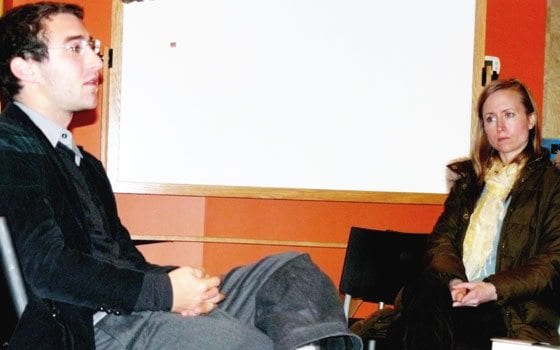

Author: McSweeney’s BooksEditor Craig Walzer (left) and contributing writer/editor Rebecca Hansen speak during a reading, discussion and signing event for “Out of Exile: Narratives from the Abducted and Displaced People of Sudan,” held at the 826 Boston writing center on Washington Street in Roxbury last Thursday.
At 826 Boston, stories matter, and Craig Walzer had some pretty amazing ones to tell.
Walzer, editor of the new book “Out of Exile: Narratives from the Abducted and Displaced People of Sudan,” shared some of them with those who braved the cold and made the trek to 826 last Thursday evening to attend a reading, discussion and book signing at the Roxbury writing and education center.
“Out of Exile” is the fourth installment in the McSweeney’s Voice of Witness book series, a publishing initiative aimed at bringing human rights issues to the forefront by showcasing stories that detail extraordinary human triumphs in the face of extreme struggle. Walzer compiled the stories that make up this entry during his travels through Sudan, Kenya and Egypt.
The Sudanese civil war and accompanying regional conflict between factions in the north and south has claimed more than 3 million lives and displaced 8 million people over the last 50 years. Through a series of first-hand narratives, the book gives audience to victims of abduction, displacement and slavery in Sudan, as they speak about not only the circumstances of their exile, but also what their lives were like before they were forced to flee their native lands and their dreams of possibly returning one day.
The “Out of Exile” project began in the summer of 2007 with Walzer’s team interviewing survivors of violence and displacement throughout Egypt, Sudan and Kenya.
“One of the first things we learned was to approach the situation with a great deal of humility,” Walzer said. “It was important they knew this project wasn’t about them proving themselves worthy of our sympathy. Giving them the opportunity to tell not only the unfortunate side, but also the things that make them three-dimensional, really opened people up.”
Rebecca Hansen, an independent freelance writer and editor, contributed to the project, interviewing a few relocated Sudanese now living in the Boston area and editing select narratives. Joining Walzer at the book signing, she emphasized the value of using the actual accounts of Sudanese survivors — not merely telling their stories through secondhand accounts — in pushing the project and inspiring readers.
“Part of the idea behind the book is getting down to the individual level and relating individual experience that gives people an outlet to make a personal connection and develop and uncover a way of getting involved,” said Hansen.
One of the people Hansen interviewed was Panther Alier, a 31-year-old Sudanese survivor. Alier arrived in Boston in 2001 as one of the “Lost Boys and Girls of Sudan,” a group of 3,800 orphaned and displaced South Sudanese allowed to resettle in the United States.
Alier offered a brief account of his story and the suffering that continues in Sudan, and fielded questions from attendees last Thursday night, via Web cam from Brandeis University, where he is studying for a master’s degree in sustainable international development from the Heller School for Social Policy and Management.
“I knew that my narrative would come alive in this book, and so it was exciting in the sense that a book can be read anywhere and by anyone,” Alier said.
Still, he said, he doesn’t believe that readers will be able to fully grasp the life he lived and the horrors he experienced.
“The environment that I was in demanded that I be an adult early on in order to survive,” he said. “Living in Ethiopia for the few months that I did was traumatic. I was about 10 years old and burying people that were my age.”
Each of the evening’s speakers stressed the importance of an international, long-term commitment to remedying the longstanding conflict in the Sudan. They said they hope the book — which is sold-out in hardcover, but available in paperback — will create a personal connection in readers and spur them to get involved.
“As far away as these people are, they are humans first and victims second,” said Walzer. “Their situation demands the sympathy of one human to another.”






